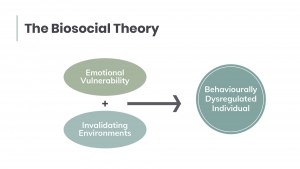DBT London: Where Hope and Healing Intersect for Lasting Adjustment
DBT London: Where Hope and Healing Intersect for Lasting Adjustment
Blog Article
Nurturing Emotional Resilience and Self-Awareness With Dialectical Behavior Treatment (Dbt) Services: Your Journey to Inner Peace
In the search of emotional resilience and self-awareness, the use of Dialectical Practices Treatment (DBT) solutions uses a structured approach that integrates various essential principles to foster internal tranquility. Understanding the core tenets of DBT offers a solid structure for people looking for to navigate their psychological landscape with greater clarity and control. By delving into the ins and outs of psychological guideline, social effectiveness, mindfulness methods, and distress resistance methods, one embarks on a transformative journey in the direction of boosted wellness and self-discovery. The course to internal peace with DBT services is not just concerning taking care of emotions however also concerning growing a much deeper connection with oneself and others, inevitably leading to an extra harmonious presence.
Understanding DBT Basics
DBT is a restorative approach established by Marsha M. Linehan to aid people struggling with psychological dysregulation, frequently linked with conditions like borderline character condition. Feeling regulation strategies aid individuals determine and handle extreme emotions successfully. By recognizing these essential aspects of DBT, people can cultivate emotional resilience by learning to handle their feelings, navigate connections, and cope with traumatic scenarios much more efficiently.

Creating Emotional Guideline Skills
Creating proficiency in psychological law skills is crucial for enhancing one's ability to navigate tough scenarios and manage intense emotions properly. Psychological guideline entails the capacity to recognize, understand, and manage one's emotions in a healthy and positive fashion. By refining these abilities, individuals can grow a higher feeling of self-control and resilience despite adversity.
One key facet of developing psychological regulation abilities is finding out to acknowledge and identify different emotions accurately. This self-awareness makes it possible for individuals to pinpoint the origin of their sensations and respond properly. Furthermore, practicing mindfulness methods can assist individuals stay existing in the minute and protect against frustrating feelings from pirating their ideas and activities.
In addition, implementing healthy coping methods, such as deep breathing exercises, progressive muscle mass leisure, or grounding methods, can provide individuals with effective devices to manage their emotions throughout times of distress. By constantly practicing these skills, individuals can develop a strong structure for psychological durability and self-awareness, ultimately promoting inner peace and well-being.

Enhancing Interpersonal Effectiveness
With a solid foundation in psychological regulation skills, people can currently concentrate on refining their social effectiveness to navigate social communications with higher simplicity and success. Social effectiveness, a critical part of Dialectical Behavior Treatment (DBT), furnishes people with the required tools to interact assertively, established borders, and build healthier partnerships. By finding out to share viewpoints and needs plainly while respecting the perspectives of others, individuals can cultivate more significant links and reduce disputes in their communications.

Eventually, enhancing interpersonal efficiency via DBT empowers individuals to navigate different social contexts with authenticity, empathy, and resilience, cultivating even more satisfying and harmonious partnerships in their lives.
Exercising Mindfulness Techniques
Mindfulness methods play a crucial duty in improving emotional law and advertising self-awareness in individuals going through Dialectical Behaviour Treatment (DBT) By fostering present-moment recognition without judgment, mindfulness equips people to observe their thoughts and feelings with approval, causing a deeper understanding of their inner experiences. With routine technique of mindfulness strategies such useful content as mindful breathing, body scans, and mindful monitoring, individuals can establish an increased feeling of self-awareness and psychological resilience.
One essential mindfulness technique made use of in DBT is the "sensible mind" idea, which encourages individuals to incorporate their reasonable and psychological minds to make balanced decisions - DBT London. This technique allows individuals to navigate emotional triggers with a calmer and extra logical method, minimizing spontaneous responses. Furthermore, mindfulness techniques help in basing individuals in the existing minute, steering them away from rumination on previous events or anxiousness concerning the future
Building Distress Tolerance Strategies
To improve psychological strength in people undertaking Dialectical Practices Treatment (DBT), it is necessary to focus on structure efficient distress tolerance methods. Creating these strategies is vital for individuals to browse through tough situations without ending up being overloaded. Distress tolerance abilities aid people cope and stand up to with intense feelings, crises, or circumstances where they may be tempted to participate in harmful habits.
One trick distress tolerance technique usually educated in DBT is the ACCEPTS phrase, which means Activities, Contributing, Comparisons, Feelings, Pushing away, Thoughts, and Experiences. These abilities give people with a tool kit her comment is here of methods to sidetrack themselves from stressful emotions or scenarios in a healthy and balanced manner.
In addition, discovering how to self-soothe through activities like deep breathing exercises, taking a warm bathroom, or participating in pastimes can additionally assist construct distress tolerance. By incorporating these approaches into day-to-day technique, individuals can much better handle tension, manage emotions, and eventually cultivate a better feeling of emotional resilience.
Verdict
To conclude, the trip towards inner tranquility with Dialectical Practices Therapy (DBT) includes understanding its basics, creating psychological policy skills, boosting social performance, practicing mindfulness strategies, and building distress tolerance techniques. By using these methods, individuals can nurture emotional durability and self-awareness, resulting in a greater feeling of internal tranquility and wellness. DBT London. Including DBT solutions into one's life can offer important tools and sources for managing feelings and partnerships successfully
Understanding the core tenets of DBT gives a strong structure for people seeking to navigate their psychological landscape with higher clearness and control. By understanding these basic elements of DBT, individuals can grow emotional strength by learning to manage their feelings, navigate partnerships, and deal with upsetting circumstances more properly.Mindfulness methods play a pivotal duty in improving emotional official website law and promoting self-awareness in people undergoing Dialectical Behaviour Therapy (DBT)One fundamental mindfulness technique used in DBT is the "wise mind" idea, which motivates individuals to integrate their sensible and psychological minds to make well balanced decisions.To improve emotional resilience in people going through Dialectical Practices Treatment (DBT), it is vital to focus on building reliable distress resistance methods.
Report this page